The Future of Work: AI's Influence on Management and Employees
VerifiedAdded on 2022/08/23
|6
|787
|11
Essay
AI Summary
This essay examines the profound impact of Artificial Intelligence (AI) on the dynamics of work relationships within organizations. It begins with a brief introduction to AI and its capabilities, followed by an overview of the core perspectives in management. The essay then delves into the central theme: how AI and robots are reshaping the interactions between organizations, management, leadership, and employees. It discusses the potential for AI to automate tasks, augment human skills, and alter the very nature of work. The analysis considers both the benefits and challenges of AI implementation, including the potential for job displacement and the need for employees to adapt and acquire new skills. The essay concludes with a personal reflection on the future of work in the age of AI, synthesizing the evidence presented and offering insights into the implications for management, leadership, and employee well-being, supported by references to academic sources.
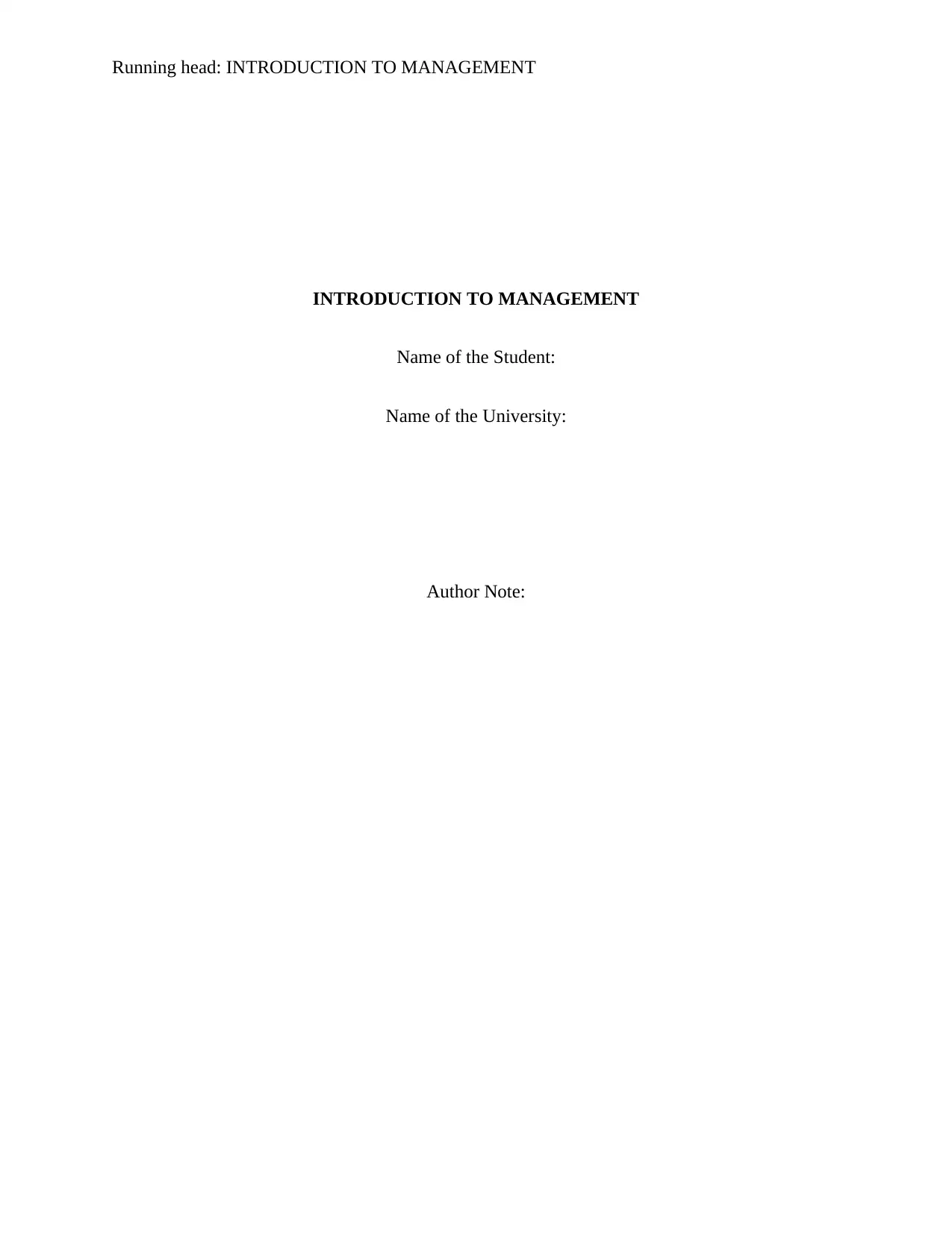
Running head: INTRODUCTION TO MANAGEMENT
INTRODUCTION TO MANAGEMENT
Name of the Student:
Name of the University:
Author Note:
INTRODUCTION TO MANAGEMENT
Name of the Student:
Name of the University:
Author Note:
Paraphrase This Document
Need a fresh take? Get an instant paraphrase of this document with our AI Paraphraser
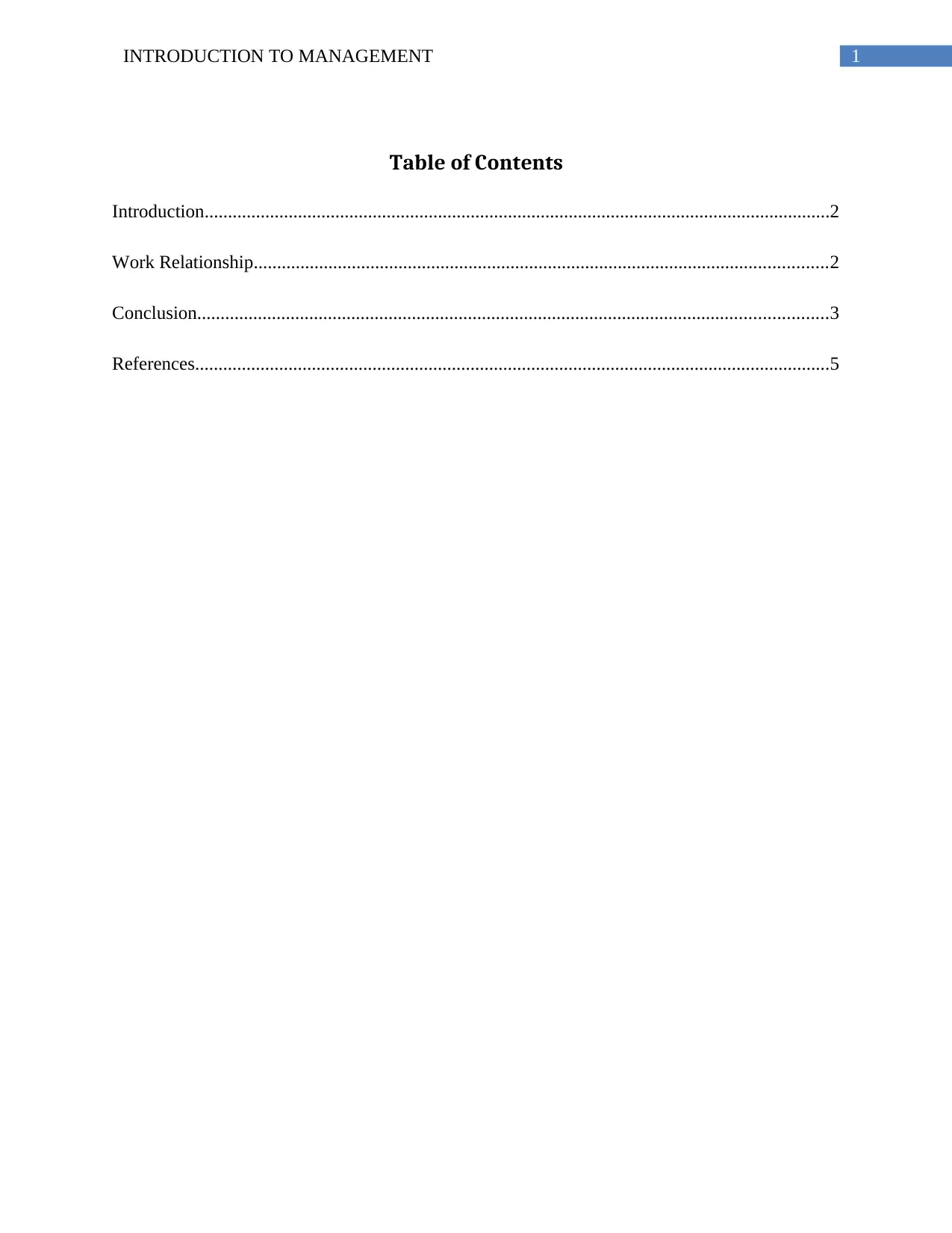
1INTRODUCTION TO MANAGEMENT
Table of Contents
Introduction......................................................................................................................................2
Work Relationship...........................................................................................................................2
Conclusion.......................................................................................................................................3
References........................................................................................................................................5
Table of Contents
Introduction......................................................................................................................................2
Work Relationship...........................................................................................................................2
Conclusion.......................................................................................................................................3
References........................................................................................................................................5
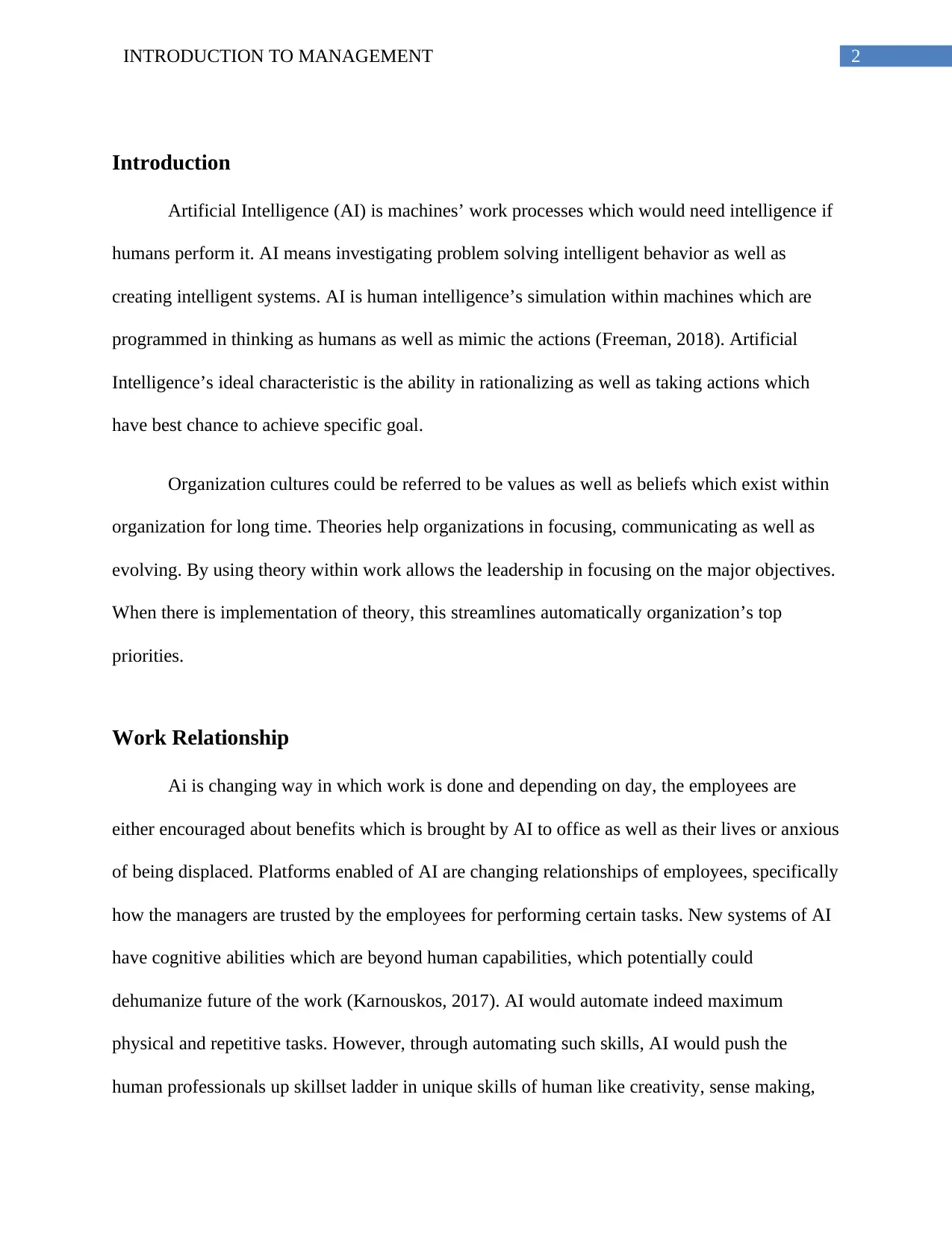
2INTRODUCTION TO MANAGEMENT
Introduction
Artificial Intelligence (AI) is machines’ work processes which would need intelligence if
humans perform it. AI means investigating problem solving intelligent behavior as well as
creating intelligent systems. AI is human intelligence’s simulation within machines which are
programmed in thinking as humans as well as mimic the actions (Freeman, 2018). Artificial
Intelligence’s ideal characteristic is the ability in rationalizing as well as taking actions which
have best chance to achieve specific goal.
Organization cultures could be referred to be values as well as beliefs which exist within
organization for long time. Theories help organizations in focusing, communicating as well as
evolving. By using theory within work allows the leadership in focusing on the major objectives.
When there is implementation of theory, this streamlines automatically organization’s top
priorities.
Work Relationship
Ai is changing way in which work is done and depending on day, the employees are
either encouraged about benefits which is brought by AI to office as well as their lives or anxious
of being displaced. Platforms enabled of AI are changing relationships of employees, specifically
how the managers are trusted by the employees for performing certain tasks. New systems of AI
have cognitive abilities which are beyond human capabilities, which potentially could
dehumanize future of the work (Karnouskos, 2017). AI would automate indeed maximum
physical and repetitive tasks. However, through automating such skills, AI would push the
human professionals up skillset ladder in unique skills of human like creativity, sense making,
Introduction
Artificial Intelligence (AI) is machines’ work processes which would need intelligence if
humans perform it. AI means investigating problem solving intelligent behavior as well as
creating intelligent systems. AI is human intelligence’s simulation within machines which are
programmed in thinking as humans as well as mimic the actions (Freeman, 2018). Artificial
Intelligence’s ideal characteristic is the ability in rationalizing as well as taking actions which
have best chance to achieve specific goal.
Organization cultures could be referred to be values as well as beliefs which exist within
organization for long time. Theories help organizations in focusing, communicating as well as
evolving. By using theory within work allows the leadership in focusing on the major objectives.
When there is implementation of theory, this streamlines automatically organization’s top
priorities.
Work Relationship
Ai is changing way in which work is done and depending on day, the employees are
either encouraged about benefits which is brought by AI to office as well as their lives or anxious
of being displaced. Platforms enabled of AI are changing relationships of employees, specifically
how the managers are trusted by the employees for performing certain tasks. New systems of AI
have cognitive abilities which are beyond human capabilities, which potentially could
dehumanize future of the work (Karnouskos, 2017). AI would automate indeed maximum
physical and repetitive tasks. However, through automating such skills, AI would push the
human professionals up skillset ladder in unique skills of human like creativity, sense making,
⊘ This is a preview!⊘
Do you want full access?
Subscribe today to unlock all pages.

Trusted by 1+ million students worldwide
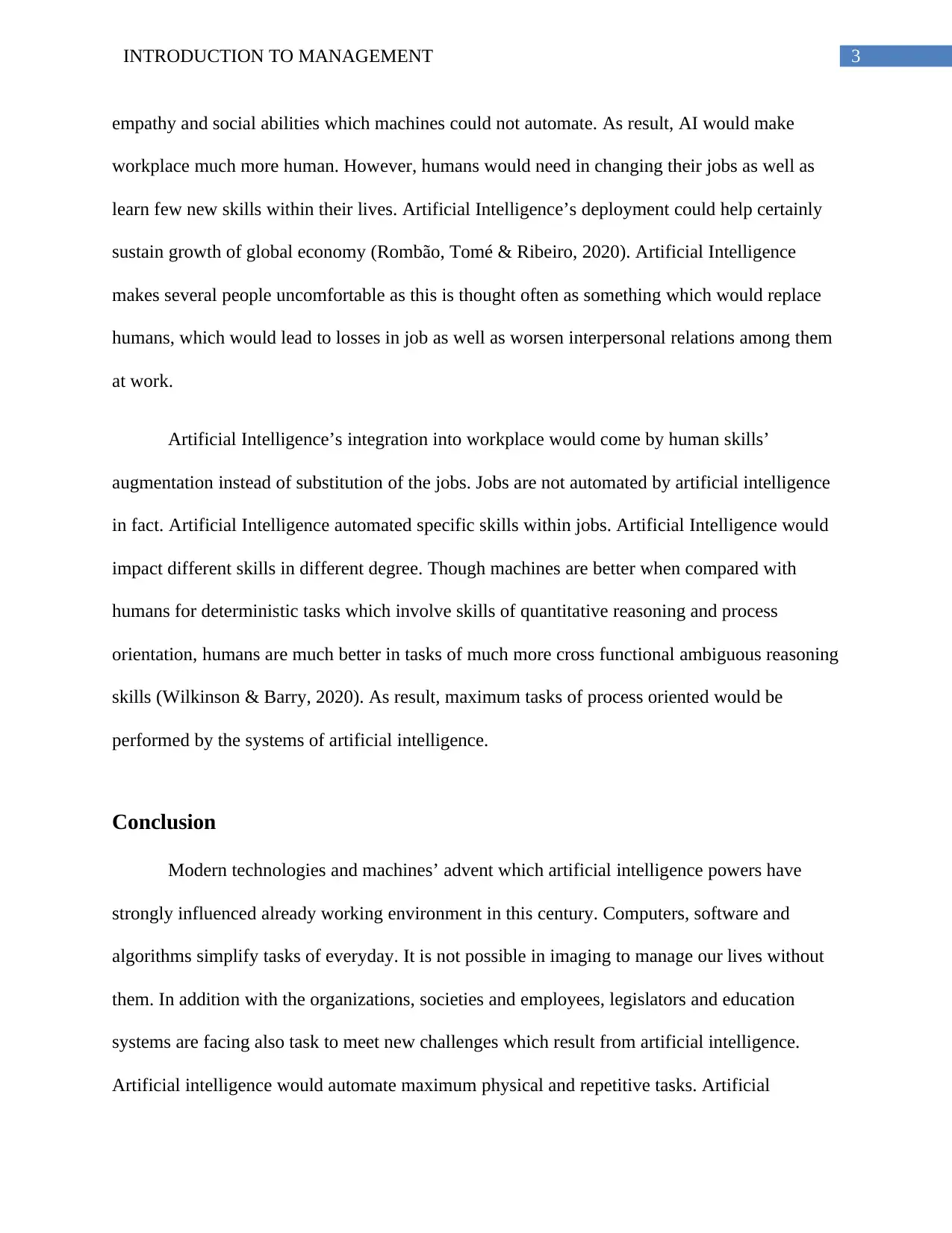
3INTRODUCTION TO MANAGEMENT
empathy and social abilities which machines could not automate. As result, AI would make
workplace much more human. However, humans would need in changing their jobs as well as
learn few new skills within their lives. Artificial Intelligence’s deployment could help certainly
sustain growth of global economy (Rombão, Tomé & Ribeiro, 2020). Artificial Intelligence
makes several people uncomfortable as this is thought often as something which would replace
humans, which would lead to losses in job as well as worsen interpersonal relations among them
at work.
Artificial Intelligence’s integration into workplace would come by human skills’
augmentation instead of substitution of the jobs. Jobs are not automated by artificial intelligence
in fact. Artificial Intelligence automated specific skills within jobs. Artificial Intelligence would
impact different skills in different degree. Though machines are better when compared with
humans for deterministic tasks which involve skills of quantitative reasoning and process
orientation, humans are much better in tasks of much more cross functional ambiguous reasoning
skills (Wilkinson & Barry, 2020). As result, maximum tasks of process oriented would be
performed by the systems of artificial intelligence.
Conclusion
Modern technologies and machines’ advent which artificial intelligence powers have
strongly influenced already working environment in this century. Computers, software and
algorithms simplify tasks of everyday. It is not possible in imaging to manage our lives without
them. In addition with the organizations, societies and employees, legislators and education
systems are facing also task to meet new challenges which result from artificial intelligence.
Artificial intelligence would automate maximum physical and repetitive tasks. Artificial
empathy and social abilities which machines could not automate. As result, AI would make
workplace much more human. However, humans would need in changing their jobs as well as
learn few new skills within their lives. Artificial Intelligence’s deployment could help certainly
sustain growth of global economy (Rombão, Tomé & Ribeiro, 2020). Artificial Intelligence
makes several people uncomfortable as this is thought often as something which would replace
humans, which would lead to losses in job as well as worsen interpersonal relations among them
at work.
Artificial Intelligence’s integration into workplace would come by human skills’
augmentation instead of substitution of the jobs. Jobs are not automated by artificial intelligence
in fact. Artificial Intelligence automated specific skills within jobs. Artificial Intelligence would
impact different skills in different degree. Though machines are better when compared with
humans for deterministic tasks which involve skills of quantitative reasoning and process
orientation, humans are much better in tasks of much more cross functional ambiguous reasoning
skills (Wilkinson & Barry, 2020). As result, maximum tasks of process oriented would be
performed by the systems of artificial intelligence.
Conclusion
Modern technologies and machines’ advent which artificial intelligence powers have
strongly influenced already working environment in this century. Computers, software and
algorithms simplify tasks of everyday. It is not possible in imaging to manage our lives without
them. In addition with the organizations, societies and employees, legislators and education
systems are facing also task to meet new challenges which result from artificial intelligence.
Artificial intelligence would automate maximum physical and repetitive tasks. Artificial
Paraphrase This Document
Need a fresh take? Get an instant paraphrase of this document with our AI Paraphraser
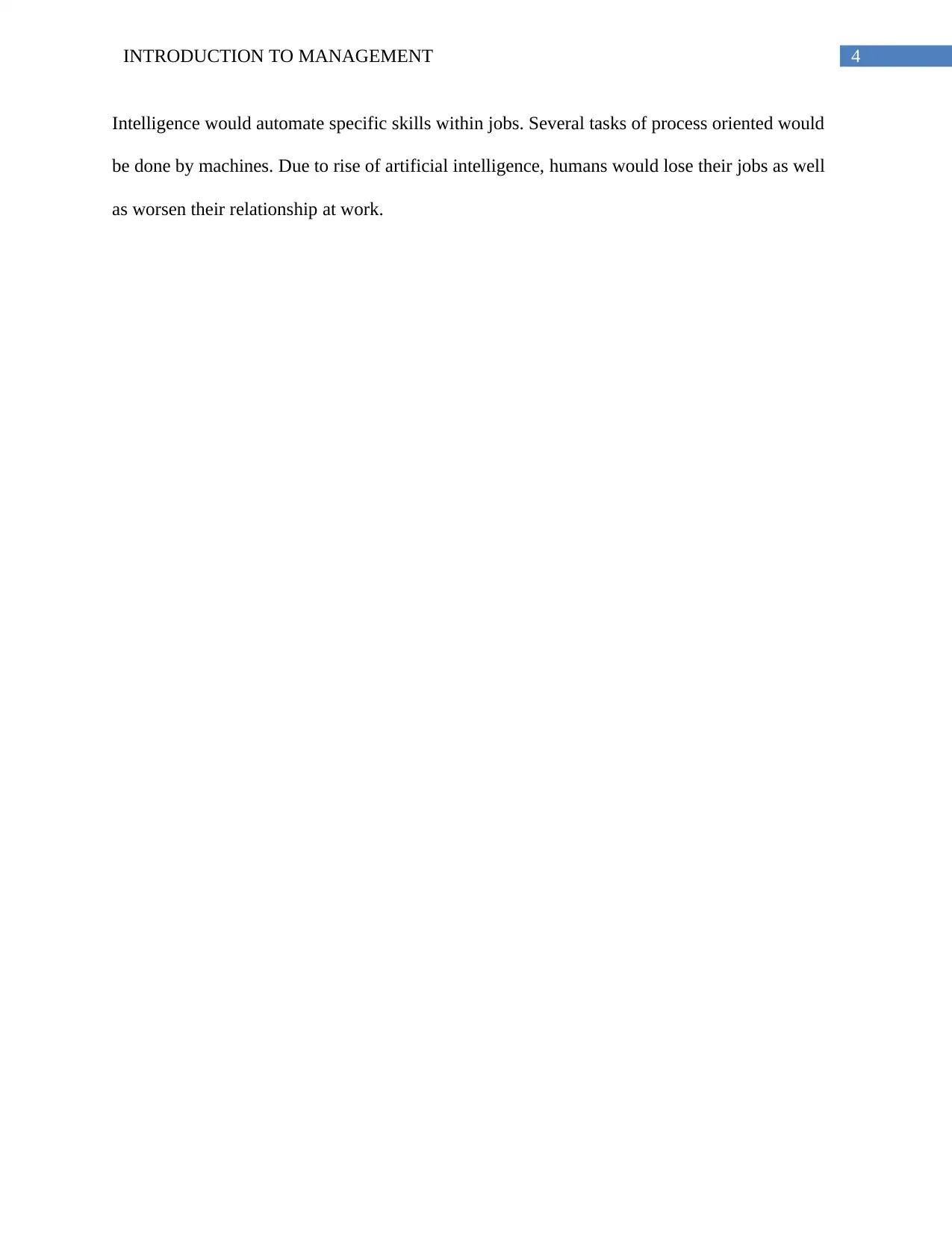
4INTRODUCTION TO MANAGEMENT
Intelligence would automate specific skills within jobs. Several tasks of process oriented would
be done by machines. Due to rise of artificial intelligence, humans would lose their jobs as well
as worsen their relationship at work.
Intelligence would automate specific skills within jobs. Several tasks of process oriented would
be done by machines. Due to rise of artificial intelligence, humans would lose their jobs as well
as worsen their relationship at work.
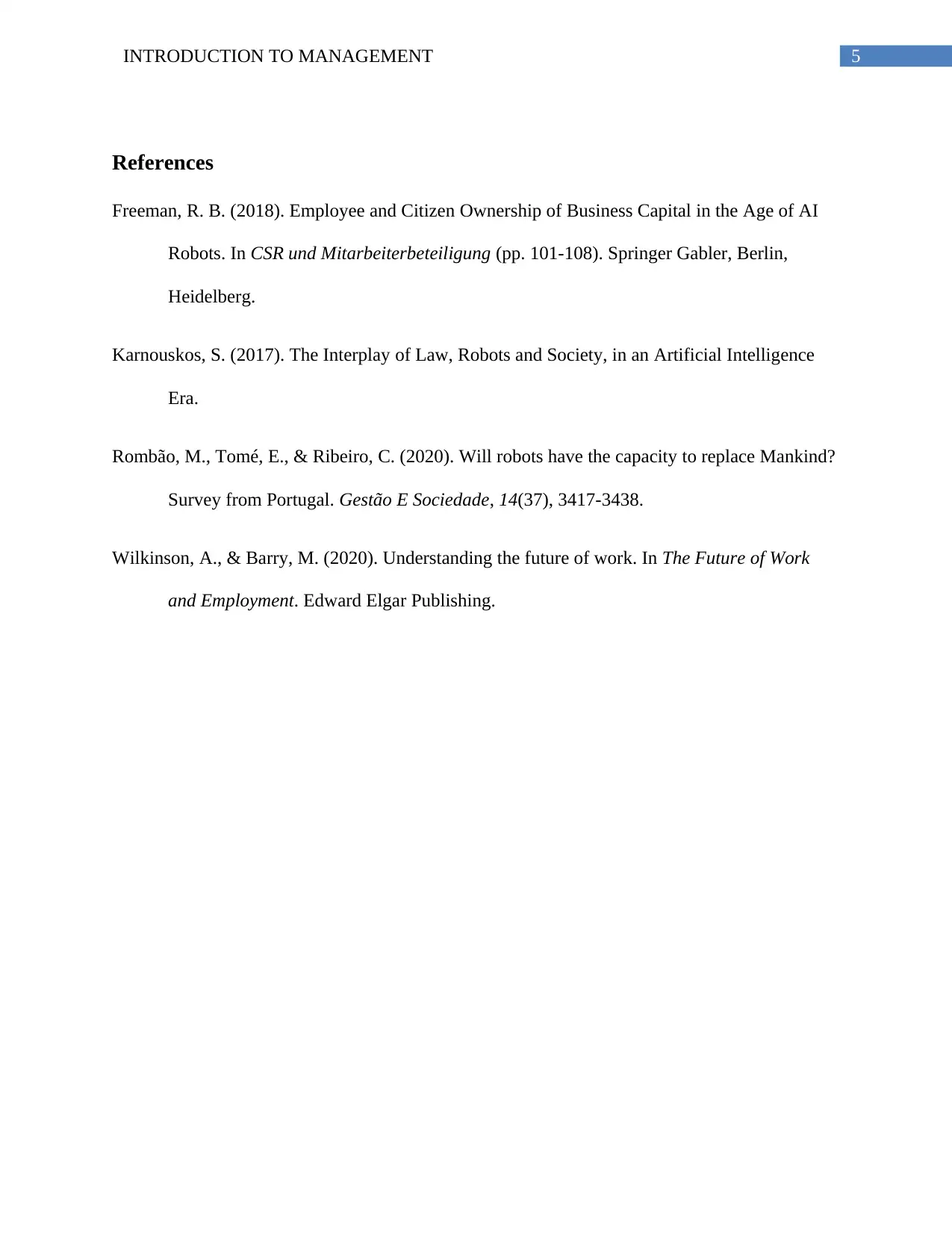
5INTRODUCTION TO MANAGEMENT
References
Freeman, R. B. (2018). Employee and Citizen Ownership of Business Capital in the Age of AI
Robots. In CSR und Mitarbeiterbeteiligung (pp. 101-108). Springer Gabler, Berlin,
Heidelberg.
Karnouskos, S. (2017). The Interplay of Law, Robots and Society, in an Artificial Intelligence
Era.
Rombão, M., Tomé, E., & Ribeiro, C. (2020). Will robots have the capacity to replace Mankind?
Survey from Portugal. Gestão E Sociedade, 14(37), 3417-3438.
Wilkinson, A., & Barry, M. (2020). Understanding the future of work. In The Future of Work
and Employment. Edward Elgar Publishing.
References
Freeman, R. B. (2018). Employee and Citizen Ownership of Business Capital in the Age of AI
Robots. In CSR und Mitarbeiterbeteiligung (pp. 101-108). Springer Gabler, Berlin,
Heidelberg.
Karnouskos, S. (2017). The Interplay of Law, Robots and Society, in an Artificial Intelligence
Era.
Rombão, M., Tomé, E., & Ribeiro, C. (2020). Will robots have the capacity to replace Mankind?
Survey from Portugal. Gestão E Sociedade, 14(37), 3417-3438.
Wilkinson, A., & Barry, M. (2020). Understanding the future of work. In The Future of Work
and Employment. Edward Elgar Publishing.
⊘ This is a preview!⊘
Do you want full access?
Subscribe today to unlock all pages.

Trusted by 1+ million students worldwide
1 out of 6
Related Documents
Your All-in-One AI-Powered Toolkit for Academic Success.
+13062052269
info@desklib.com
Available 24*7 on WhatsApp / Email
![[object Object]](/_next/static/media/star-bottom.7253800d.svg)
Unlock your academic potential
Copyright © 2020–2026 A2Z Services. All Rights Reserved. Developed and managed by ZUCOL.





